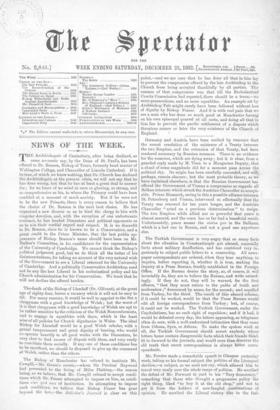Germany and Austria have been excited by rumours that the
recent revelation of the existence of a Treaty between the two Empires, and the extension of that Treaty, had been rendered necessary by Russian menaces. There is no evidence for the rumours, which are dying away; but it is dear, from a guarded reply made by M. Tisza to a Hungarian Deputy, that a cloud of some magnitude did for a moment pass across the political sky. Its origin has been carefully concealed, and will, perhaps, remain obscure; but the most probable theory, as we have explained elsewhere, is that the Russian Government has offered the Government of Vienna a compromise as regards all Balkan interests which struck the Austrian Chancellor as accept- able. Prince Bismarck, seeing in this a possible alliance between St. Petersburg and Vienna, intervened so effectually that the Treaty was renewed, for ten years longer, and the Austrian Chancellor "acted on a previous determination" to resign. The two Empires while allied are so powerful that peace is almost assured, and the scare has so far had a beneficial result. Unfortunately, peace means the statue quo in the Balkans, which is a bad one in Bosnia, and not a good one anywhere else.

































